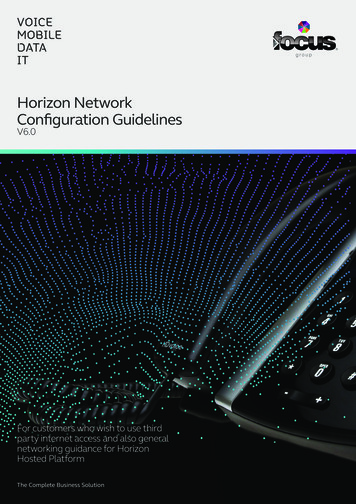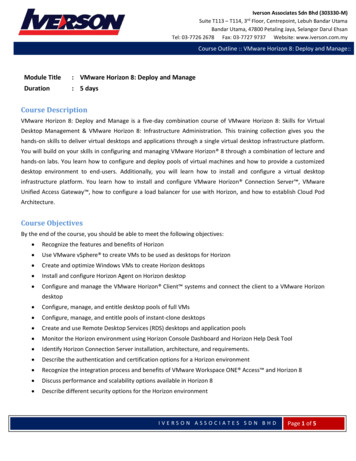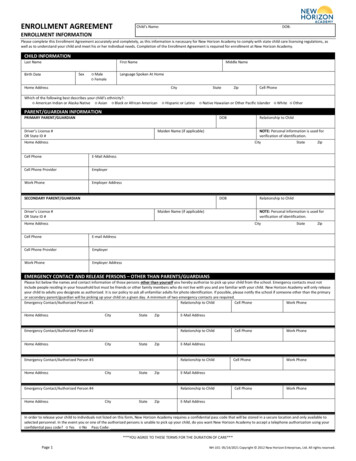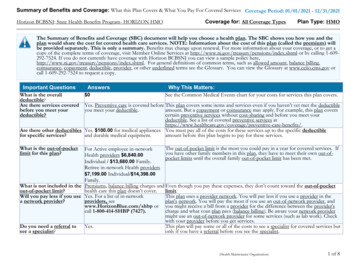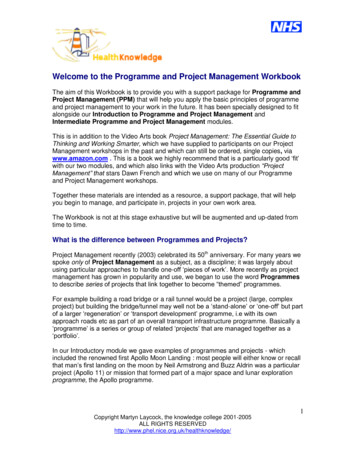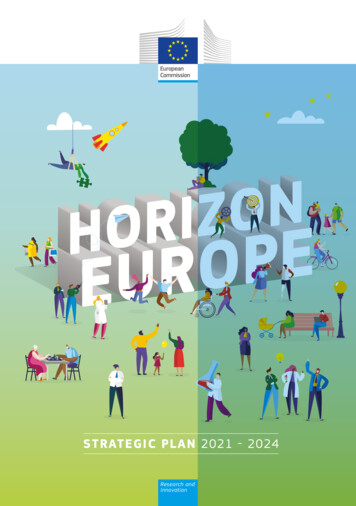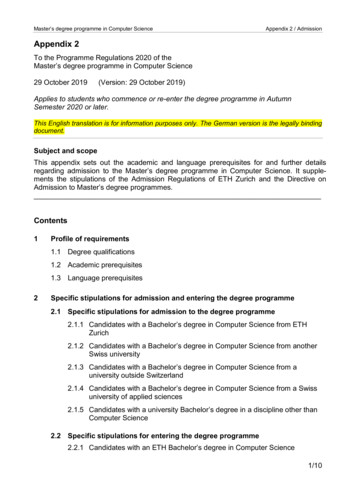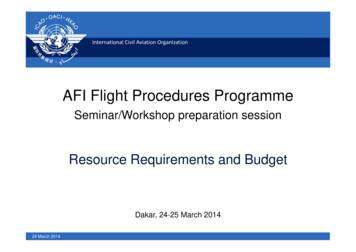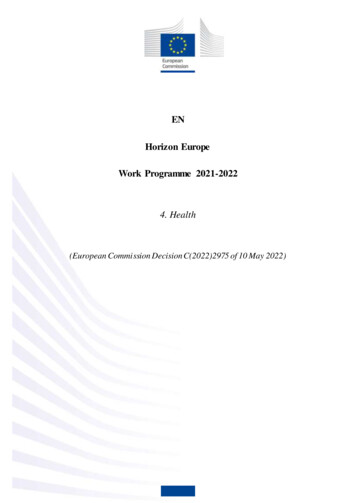
Transcription
ENHorizon EuropeWork Programme 2021-20224. Health(European Commission Decision C(2022)2975 of 10 May 2022)
Horizon Europe - Work Programme 2021-2022HealthTable of contentsIntroduction. 7Destination 1 – Staying healthy in a rapidly changing society. 12Call - Staying Healthy (2021). 15Conditions for the Call . 15HORIZON-HLTH-2021-STAYHLTH-01-02: Towards a molecular and neurobiologicalunderstanding of mental health and mental illness for the benefit of citizens and patients . 16HORIZON-HLTH-2021-STAYHLTH-01-03: Healthy Citizens 2.0 - Supporting digitalempowerment and health literacy of citizens . 19HORIZON-HLTH-2021-STAYHLTH-01-04: A roadmap for personalised prevention . 21HORIZON-HLTH-2021-STAYHLTH-01-05: Mobilising a network of National ContactPoints (NCPs) for the Health Cluster. 22Call - Staying healthy (Two stage - 2022) . 24Conditions for the Call . 24HORIZON-HLTH-2022-STAYHLTH-01-01-two-stage: Boosting mental health in Europein times of change . 26HORIZON-HLTH-2022-STAYHLTH-01-04-two-stage: Trustworthy artificial intelligence(AI) tools to predict the risk of chronic non-communicable diseases and/or theirprogression . 29HORIZON-HLTH-2022-STAYHLTH-01-05-two-stage: Prevention of obesity throughoutthe life course . 32Call - Staying healthy (Single stage, 2022) . 35Conditions for the Call . 35HORIZON-HLTH-2022-STAYHLTH-02-01: Personalised blueprint of chronicinflammation in health-to-disease transition . 36Destination 2. Living and working in a health-promoting environment . 39Call - Environment and health (2021) . 42Conditions for the Call . 42HORIZON-HLTH-2021-ENVHLTH-02-01: Exposure to electromagnetic fields (EMF) andhealth . 43HORIZON-HLTH-2021-ENVHLTH-02-02: Indoor air quality and health . 45HORIZON-HLTH-2021-ENVHLTH-02-03: Health impacts of climate change, costs andbenefits of action and inaction . 48Call - Partnerships in Health (2021) . 50Conditions for the Call . 51Part 4 - Page 2 of 191
Horizon Europe - Work Programme 2021-2022HealthHORIZON-HLTH-2021-ENVHLTH-03-01: European partnership for the assessment ofrisks from chemicals (PARC) . 52Call - Environment and health (Single Stage - 2022). 57Conditions for the Call . 57HORIZON-HLTH-2022-ENVHLTH-04-01: Methods for assessing health-related costs ofenvironmental stressors . 58Destination 3. Tackling diseases and reducing disease burden. 61Call - Tackling diseases (2021). 65Conditions for the Call . 65HORIZON-HLTH-2021-DISEASE-04-01: Improved supportive, palliative, survivorshipand end-of-life care of cancer patients. 66HORIZON-HLTH-2021-DISEASE-04-02: Building a European innovation platform forthe repurposing of medicinal products. 69HORIZON-HLTH-2021-DISEASE-04-03: Innovative approaches to enhance povertyrelated diseases research in sub-Saharan Africa . 71HORIZON-HLTH-2021-DISEASE-04-04: Clinical validation of artificial intelligence (AI)solutions for treatment and care . 73HORIZON-HLTH-2021-DISEASE-04-07: Personalised medicine and infectious diseases:understanding the individual host response to viruses (e.g. SARS-CoV-2) . 75HORIZON-HLTH-2021-DISEASE-04-05: A roadmap towards the creation of theEuropean partnership on One Health antimicrobial resistance (OH AMR). 77HORIZON-HLTH-2021-DISEASE-04-06: Building a European partnership for pandemicpreparedness . 80Call - Tackling diseases (Two Stage - 2022). 82Conditions for the Call . 82HORIZON-HLTH-2022-DISEASE-06-02-two-stage: Pre-clinical development of the nextgeneration of immunotherapies for diseases or disorders with unmet medical needs . 83HORIZON-HLTH-2022-DISEASE-06-03-two-stage: Vaccines 2.0 - developing the nextgeneration of vaccines . 85HORIZON-HLTH-2022-DISEASE-06-04-two-stage: Development of new effectivetherapies for rare diseases . 87Call - Tackling diseases (Single Stage - 2022) . 90Conditions for the Call . 90HORIZON-HLTH-2022-DISEASE-07-02: Pandemic preparedness . 91HORIZON-HLTH-2022-DISEASE-07-03: Non-communicable diseases risk reduction inadolescence and youth (Global Alliance for Chronic Diseases - GACD) . 92HORIZON-HLTH-2022-DISEASE-07-01: Support for the functioning of the GlobalResearch Collaboration for Infectious Disease Preparedness (GloPID-R) . 95Call - Partnerships in Health (2022) . 96Part 4 - Page 3 of 191
Horizon Europe - Work Programme 2021-2022HealthConditions for the Call . 97HORIZON-HLTH-2022-DISEASE-03-01: European partnership fostering a EuropeanResearch Area (ERA) for health research . 98Destination 4. Ensuring access to innovative, sustainable and high-qualityhealth care . 105Call - Ensuring access to innovative, sustainable and high-quality health care (2021) 109Conditions for the Call . 109HORIZON-HLTH-2021-CARE-05-01: Enhancing quality of care and patient safety. 110HORIZON-HLTH-2021-CARE-05-02: Data-driven decision-support tools for better healthcare delivery and policy-making with a focus on cancer . 112HORIZON-HLTH-2021-CARE-05-04: Health care innovation procurement network . 115Call - Ensuring access to innovative, sustainable and high-quality health care (SingleStage - 2022). 119Conditions for the Call . 119HORIZON-HLTH-2022-CARE-08-02: Pre-commercial research and innovationprocurement (PCP) for building the resilience of health care systems in the context ofrecovery. 120HORIZON-HLTH-2022-CARE-08-03: Public procurement of innovative solutions (PPI)for building the resilience of health care systems in the context of recovery . 122HORIZON-HLTH-2022-CARE-08-04: Better financing models for health systems . 124Call - Partnerships in Health (2022) . 127Conditions for the Call . 127HORIZON-HLTH-2022-CARE-10-01: European partnership on transforming health andcare systems. 128Destination 5. Unlocking the full potential of new tools, technologies anddigital solutions for a healthy society . 134Call - Tools and technologies for a healthy society (2021) . 137Conditions for the Call . 137HORIZON-HLTH-2021-TOOL-06-01: Smart medical devices and their surgicalimplantation for use in resource-constrained settings . 138HORIZON-HLTH-2021-TOOL-06-02: Next generation advanced therapies to treat highlyprevalent and high burden diseases with unmet medical needs . 139HORIZON-HLTH-2021-TOOL-06-03: Innovative tools for use and re-use of health data(in particular of electronic health records and/or patient registries) . 141Call - Tools and technologies for a healthy society (Single Stage - 2022). 143Conditions for the Call . 143Part 4 - Page 4 of 191
Horizon Europe - Work Programme 2021-2022HealthHORIZON-HLTH-2022-TOOL-11-01: Optimising effectiveness in patients of existingprescription drugs for major diseases (except cancer) with the use of biomarkers . 144HORIZON-HLTH-2022-TOOL-11-02: New methods for the effective use of real-worlddata and/or synthetic data in regulatory decision-making and/or in health technologyassessment . 145Call - Tools and technologies for a healthy society (two-stages - 2022) . 148Conditions for the Call . 148HORIZON-HLTH-2022-TOOL-12-01-two-stage: Computational models for new patientstratification strategies. 149Destination 6. Maintaining an innovative, sustainable and globallycompetitive health industry. 152Call - A competitive health-related industry (2021). 155Conditions for the Call . 155HORIZON-HLTH-2021-IND-07-01: Green pharmaceuticals . 156HORIZON-HLTH-2021-IND-07-02: Development, procurement and responsiblemanagement of new antimicrobials . 158HORIZON-HLTH-2021-IND-07-03: Promoting a trusted mHealth label in Europe: uptakeof technical specifications for quality and reliability of health and wellness apps . 159Call - A competitive health-related industry (2022). 161Conditions for the Call . 161HORIZON-HLTH-2022-IND-13-01: Enhancing cybersecurity of connected medicaldevices . 163HORIZON-HLTH-2022-IND-13-02: Scaling up multi-party computation, dataanonymisation techniques, and synthetic data generation . 164HORIZON-HLTH-2022-IND-13-03: New pricing and payment models for cost-effectiveand affordable health innovations . 166HORIZON-HLTH-2022-IND-13-04: Setting up a European Smart Health Innovation Hub. 168HORIZON-HLTH-2022-IND-13-05: Setting up a European Electronic Health RecordExchange Format (EEHRxF) Ecosystem. 170Other Actions not subject to calls for proposals. 173Grants to identified beneficiaries . 1731. Grant to the Global Alliance for Chronic Diseases (GACD). 1732. European registry for human pluripotent stem cell lines . 1743. CEPI 3 - Contribution to the Coalition for Epidemics Preparedness Initiative . 1754. CEPI 4 - Contribution to the Coalition for Epidemics Preparedness Initiative . 176Other Instruments . 178Part 4 - Page 5 of 191
Horizon Europe - Work Programme 2021-2022Health1. Mobilisation of Research funds in case of Public Health Emergencies: COVID-19,second quarter of 2021 . 1782. Studies, conferences, events and outreach activities . 1813. Mobilisation of research funds in case of Public Health Emergencies . 1814. Subscription to the Human Frontier Science Program Organization. 1835. External expertise . 1836. Implement, expand and improve the Global Observatory on Health R&D . 184Budget . 186Part 4 - Page 6 of 191
Horizon Europe - Work Programme 2021-2022HealthIntroductionThe Union and the world are challenged by the COVID-19 pandemic. While it has uncoveredvulnerabilities in our social and economic systems, it has also provided new impetus,visibility and recognition of the critical role that health care systems and health professionalsplay in responding to the needs of people, serving society and underpinn ing the economy. Italso underlined the power of research and innovation in uncovering the knowledge anddeveloping the technologies to respond rapidly and effectively to public health emergencies.In addition to the direct suffering that COVID-19 is causing to symptomatic patients and theirfamilies, including long-term COVID-19 symptoms in survivors, the social distancingmeasures and lockdowns are causing major disruptions in social and economic lifeaggravating inequalities, loneliness and neglect, but also increasing existential fears, anxietiesand distress, with serious negative impact on mental health and well-being. Population groupswho are at risk of COVID-19, such as people suffering from co-morbidities and the elderly,are affected by these measures disproportionately but also young people entering andestablishing their adult life. There is thus an urgent need for research and innovation tounderstand the long-term effects of both COVID-19 and the social distancing measures onpeople’s health and well-being, and in turn develop effective responses for a solid recovery ofthe Union. Research conducted during the pandemic and following its sequels is pivotal toinform preparedness for potential similar events in the future. The pandemic has alsodemonstrated the downside of globalisation in which the dependence on global value chainscan quickly result in shortages of critical supplies, such as essential medicines or other healthtechnologies.To help repair the economic and social damage caused by the coronavirus pandemic, theEuropean Commission, the European Parliament and EU Member States leaders have agreedon a Recovery Plan for Europe that will lead the way out of the crisis and lay the foundationsfor a modern and more sustainable Union. The Health cluster will put the focus of this workprogramme mainly to this endeavour, which will benefit from financial resources from thisMultiannual Financial Framework and from NextGenerationEU (NGEU), the Union’sfinancing instrument to boost the recovery. It requires research and innovation supporting therecovery of people and communities from COVID-19 but also for making society moreresilient and national health systems better prepared to any future public health emergency.The Recovery Plan aims the Union to building back better, which also entails supporting thetwin digital and green transitions by unlocking the full potential of data-enabled research andinnovation for digitised health systems and a competitive and secure data-economy, includingon the basis of European Electronic Health Records as well as the establishment of theEuropean Health Data Space. The digital transformation of health and care will certainly helpto increase the capacity of health care systems to deliver more personalised and effectivehealth care with less resource wasting. It will contribute but is not sufficient for making theUnion the first climate-neutral continent by 2050, with zero pollution and zero waste.Additional efforts are needed to make also the delivery of health care, the design of healthtechnologies and their manufacturing more sustainable by reducing energy consumption,Part 4 - Page 7 of 191
Horizon Europe - Work Programme 2021-2022Healthwaste, pollution and the release of harmful substances, including pharmaceuticals, into theenvironment.Even though research and innovation has the power to uncovering the knowledge anddeveloping the technologies to serve societal well-being, economic prosperity andenvironmental sustainability, it only can succeed through cooperation of the best researchteams with the prospective users of such knowledge and technologies. It is thus of outmostimportance to involve those users - like patients and healthy citizens, health care professionalsproviders and payers, public health authorities and regulators, researchers or innovators fromacademia and industry - early in the knowledge generation or technology developmentprocess, including through patient/citizen engagement, community involvement or otherforms of social innovation approaches, such that research and innovation activities areadjusted to the users’ particular expectations, needs, constraints and potential. Anycooperation would benefit from adequate intellectual property management strategies.Beyond cooperating along the value chain of knowledge and know-how production andvalorisation or within the knowledge triangle (research-education-innovation), it is in theEU’s strategic interest to also reach out and cooperate with other countries outside the EU andon other continents. This applies in particular for multi-lateral cooperation on (global) healthissues with countries associated to Horizon Europe but also with other partner countries andregions in the world. In recognition of the opening of the US National Institutes of Health’sprogrammes to European researchers, any legal entity established in the United States ofAmerica is eligible to receive Union funding to support its participation in projects fundedunder the Health cluster.Nevertheless, the pandemic shows also the importance of effective coordination among EUMember States in the area of health. The European Commission is building a strong EuropeanHealth Union, in which all EU Member States prepare and respond together to health crises,in synergy with national activities in the area of crisis preparedness and resp onse; medicalsupplies are available, affordable and innovative, and countries work together to improveprevention, diagnosis, treatment and aftercare for any diseases, including cancer. Strongercommon preparedness and response will rely on greater input from the Union’s agencies andbodies, including any future EU Health Emergency Preparedness and Response Authority(EU-HERA) for which the HERA incubator foresees preparatory actions 1. Likewise, someresearch and innovation actions under the Health Cluster should deliver relevantcomplementary inputs to the announced “Europe’s Beating Cancer Plan” 2, contributing toactions covering the entire cancer care pathway, including prevention, early detection,diagnosis, treatment, cancer data monitoring, as well as quality of life of cancer patients andsurvivors.Horizon Europe is the research and innovation support programme in a system of Europeanand national funding programmes that share policy objectives. Through the programme,12HERA Incubator: Anticipating together the threat of COVID -19 variants, COM (2021) 78 e-s-BeatingCancer-PlanPart 4 - Page 8 of 191
Horizon Europe - Work Programme 2021-2022Healthspecial attention is given to ensuring cooperation between universities, scientific communitiesand industry, including small and medium-sized enterprises, and citizens and theirrepresentatives, in order to bridge gaps between territories, generations and regional cultures,especially caring for the needs of the young in shaping Europe’s future. Moreover,accelerating the performance and boosting the use and impact of research and innovation alsorequires it to make use of complementary capacities, such as European research, innovationand space infrastructures and services, or to develop complementary activities in synergy withother European Union funding programmes. Applicants could consider and actively seekcomplementarities and synergies with, and where appropriate possibilities for further fundingof additional activities not covered by their proposal from EU, national or regionalprogrammes such as: EU4Health, Digital Europe Programme, European RegionalDevelopment Fund (ERDF), European Social Fund (ESF ), Structural Reform SupportProgramme (SRSP), Just Transition Fund (JTF), European Maritime and Fisheries Fund(EMFF), European Agricultural Fund for Rural Development (EAFRD) or InvestEU. Thiscould involve dedicated calls (EU synergies calls), meaning that actions that have beenawarded a grant under such a call could have the possibility to also receive funding underother EU programmes, including relevant shared management funds. Additionally, toencourage multi-actors approaches and to be more effective in achieving impact, applicantscould consider synergies with other relevant initiatives funded under the Horizon Europeprogramme, including the Knowledge and Innovation Communities (KICs) of the EuropeanInstitute of Innovation and Technology (EIT). The innovation ecosystems created andnurtured by the EIT-KICs can in particular contribute to building communities or platformsfor coordination and support actions, sharing knowledge or disseminating and fostering theexploitation of the project results (the proposals are also encouraged to explore other formsand means of service provisions distinct to the EIT-KICs, in particular EIT-KIC Health andEIT-KIC Digital).All could help to support the development of skills and capacities in research or healthsystems, as well as accelerating the take-up and use of scientific evidences, new technologiesand best practices in health care and by health systems, industries and markets, at national orregional level.As examples, the EU4Health programme could help to ensure that the best use is made ofresearch results and facilitate the uptake, scaling-up and deployment of health innovations inhealthcare systems and clinical practice. Thereby unlocking the potential of innovation inhealth, and improving efficiency by avoiding the duplication of activities and optimising theuse of financial resources.The ERDF focuses, amongst others, on the development and strengthening of regional andlocal research and innovation ecosystems and smart economic transformation, in line withregional/national smart specialisation strategies. It can support investment in researchinfrastructure, activities for applied research and innovation, including industrial research,experimental development and feasibility studies, building research and innovation capacit iesand uptake of advanced technologies and roll-out of innovative solutions from the FrameworkProgrammes for research and innovation through the ERDF.Part 4 - Page 9 of 191
Horizon Europe - Work Programme 2021-2022HealthThe EU’s Recovery and Resilience Facility (RRF) offers support to Member States infinancing reforms and investments that improve their resilience and their growth potential,mitigate the economic and social impacts from the COVID-19 crisis, including in the area ofhealth, and support the green and digital transition. For project ideas that go beyond the remitsof an R&I proposal and directly contribute to the objectives of the RRF it is advisable tocheck access to funding available at national level in line with the Member States’ recoveryand resilience plans for a fast and targeted support.Notwithstanding the synergies mentioned above, the work programme 2021-2022 of cluster 1‘Health’ captures synergies with other clusters based on the challenges and areas ofintervention of each destination. Further synergies are encouraged with regard tocomplementary funding opportunities provided by topics in other clusters and other pillars ofHorizon Europe, notably in the European Research Infrastructure work programme (underpillar I) 3 and the European Innovation Council work programme (under pillar III) 4. Additionalsynergies could also be explored at project-level, i.e. between the portfolio of projects fundedeither under the same topic or by establishing a portfolio of projects funded under differenttopics (of the health cluster, of the other clusters 2-6, or of the pillars I/III of Horizon Europe).In particular, applicants to calls of the health cluster are encouraged to consider, whererelevant, the services offered by the current and future EU-funded European ResearchInfrastructures, including the European Open Science Cloud. 5 ,6 Moreover, if projects usesatellite-based earth observation, positioning, navigation and/or related timing data andservices, they must make use of European space technologies and services provided byCopernicus and/or Galileo/EGNOS (other data and services may additionally be used). 734567The work programme 2021-2022 of the European Research Infrastructure programme includes thefollowing calls supporting European research infrastructures and services that are or may be relevant forhealth research and innovation: FAIR and open data sharing in support of European preparedness forinfectious diseases; FAIR and open data sharing in support of cancer research; Research Infrastructureservices for rapid research responses to infectious disease epidemics; Research Infrastructures servicesto support research addressing cancer; Enabling research infrastructure services for better use ofimaging data to address challenges in thematic research areas; Implement ing digital services toempower neuroscience research for health and brain inspired technology via EBRAINS; ResearchInfrastructures services for sustainable and inclusive Global Value Chain and Europe recovery fromsocio-economic crises.The work programme 2021-2022 of the European Innovation Council (EIC) includes the following callsfocused on strategic challenges aimed at supporting breakthrough technologies and innovations with thepotential to scale up internationally and for European companies to become market leaders: EICPathfinder Challenges: Awareness inside, Tools to measure and stimulate activity in brain tissue,Emerging technologies in cell and gene therapy, Engineered living materials; EIC TransitionChallenges: Medical technology and devices: from
understanding the individual host response to viruses (e.g. SARS-CoV-2) .75 HORIZON-HLTH-2021-DISEASE-04-05: A roadmap towards the creation of the European partnership on One Health antimicrobial resistance (OH AMR).77 HORIZON-HLTH-2021-DISEASE-04-06: Building a European partnership for pandemic
